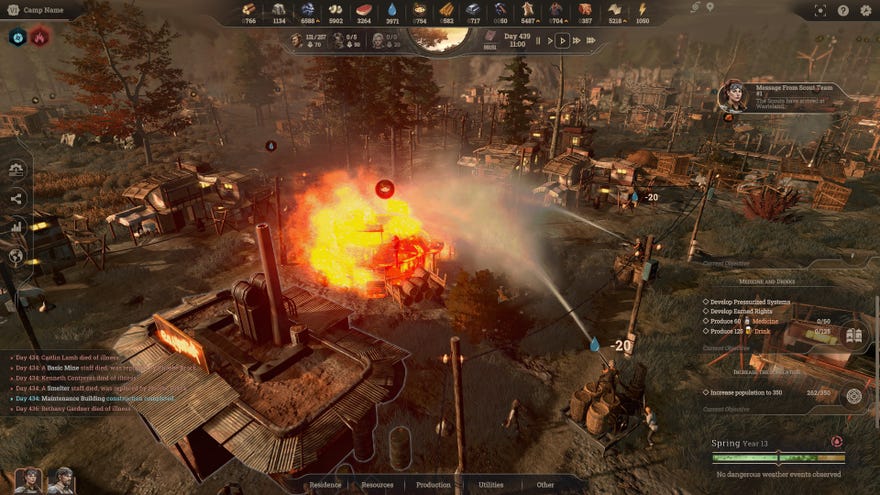The Rally Point: Dusty survival builder New Cycle struggles for a coherent identity in a busy genre
I told you flares were back
Calling dusty post-apocalyptic city builders a trend is probably a stretch, but not by much. I suppose it's a natural extension of the post-2000s explosion of the survival sim from "literally about 3 ever made" to "does your tetris remake really need the hunger meter". Games like Against The Storm porting over the roguelike element as well certainly suggest it. In my head, that's probably why New Cycle hangs out more with Endzone Dash A World Apart, and Surviving The Aftermath. It's more a traditional building game than a punishing test to be retaken, or the intense "survive the ordeal" narrative of Frostpunk, despite the superficial similarity that your town expects to be ravaged by scorching solar flares.
But it might also be because after playing it more than I really wanted to, New Cycle matches those two peers by leaving me with a vague feeling of disappointment. I'm just not sure what it really has to say.
Frostpunk's evocative setting and genuine clashes of morality, ideology, and pragmatism make for a stark contrast too to New Cycle's occasional challenges from the people. In Frostpunk, you feel the stakes thanks to its strong sound and art, and the constant pressure and sense of imminent doom that its design highlights. Always you're worrying about how much you can scavenge, how many you can save, what risks you can take, how bad things will get and where you can push your people just a little harder vs where you can risk relenting.
In New Cycle though, I completely ignored the morale of my people. Apparently it reduces their efficiency but I never noticed what difference any bonus or penalty made. Within a few days I was routinely telling people to just shut up when they complained about something because as their morale would always right itself before long, and anyway I was about 5 unlocks away from being able to do anything to cheer them up besides guarantee their deaths by dehydration in a few months by giving them extra water.
You have three classes of person, differentiated by how much you've trained them (built a training place and burned the required goods), and to which you can allocate different rations of food, clothing, even tools, the balance of which determines their morale level.
Every so often you'll have someone raise an issue, like what your settlement's attitude should be to pets, or whether paper should be allowed for private use. In theory this defines your society over time as more than just a collection of buildings, but in practice it's just some modifier somewhere to a resource consumption rate or level of health, or some other thing that I never had cause to notice. After replaying Citystate II over christmas (a game I definitely underrated until playing it after the lacklustre cities skylines 2), and vaguely recalling Atomic Society and not even particularly liking it, it's hard to feel like I have much real say over what society I'm building.
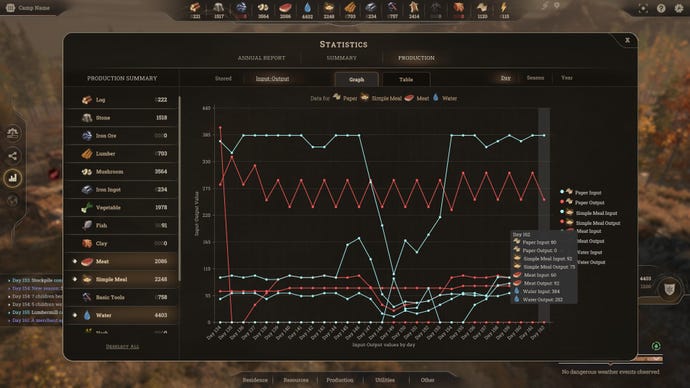
I felt no connection to my people, or to my town. You don't have to connect with them as people as in a Frostpunk or an Ostriv, but I didn't really care much for them as a resource either. I was never short of labour, but we always need more people, event text sometimes insists. I'm not sure why, except that population is tied to unlocking the next "cycle", ie the next level of unlockable technologies. It's soon apparent that the solar flares that trashed the world are coming back and you'll need to prepare, but I've no idea how to do that beyond making the numbers go up because that's how the design works.
That development is laid out far more naturally than in, say, Surviving The Aftermath, where you have to spend research points on guns before you can teach your people how to wash. But it's not clear how gathering more mouths to feed is a good thing rather than a liability, nor why you'd voluntarily create a dependency on electricity in the wake of a civilisation that died out due to a dependency on electricity, in order to prepare for a disaster that renders electrical circuits useless. And worse, it makes for an awful lot of waiting around.
Downtime in a building game isn't innately bad, of course. Sitting back and watching everything grow is fundamental to Ostriv or The Settlers (or Pioneers of Pagonia, which I've played too little of for detailed critique, but already has that delightful wuselfaktor you'd hope to see from a team including Volker Wertich). But it's almost immediately clear that although New Cycle has lots of little clickable people wandering about doing their thing, this is all for show, as buildings generate their resources regardless of distance from their feeder industry, or who's coming and going. There's almost no logistics at all.
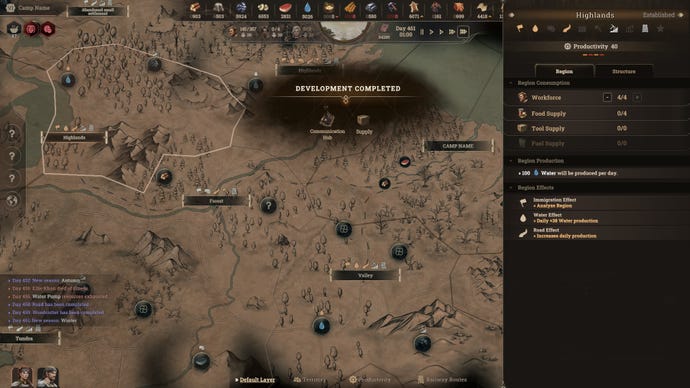
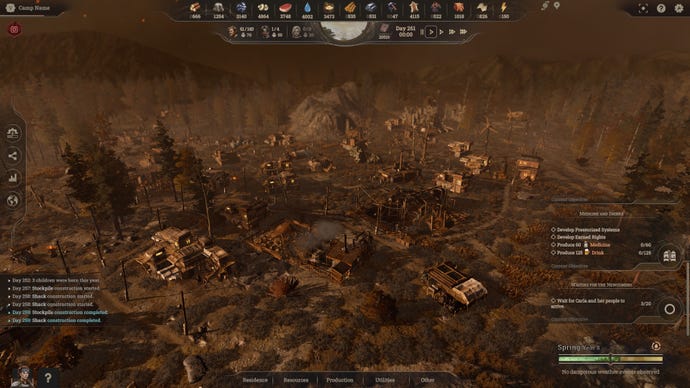
That could still work, but you can't really get lost in watching them go about their day because if you get distracted for too long you'll forget to switch off some water pumps so a well can replenish, or the craftsmen will starve again because you haven't specifically instructed them to eat Fine Meals instead of Simple Meals, and there's no way to tell them "jesus christ just eat whatever's there".
It feels unbearably cruel to be so hard on any game, so let's relent and point out that it has an estimated year or two of Early Access still to go. These are indeed early days (and only a tosser would hold it against them if "12-24 months" became 36-48. Things take as long as they take), and a lot of my complaints come down to missing connective tissue. The tension isn't there, the tangible sense of threat isn't quite there, the balance of management vs annoying chores is off; these are all things that a good rework or two, some expanded/integrated systems, and even just a more refined UI can do enormous things to straighten out.
There's also potential in its unusual setting; it's not a post-apocalypse game, but a post-post-apocalypse one. Where your archetype is dusty refugees in scabby rags sifting through piles of moisturiser tubs, medicine lids, and bent tweezers to somehow turn into a house, New Cycle's survivors are decades past that. It turns out that Fallout 3 lied to you and those people probably won't be living in a bombed out shop eating 200 year old cereal. There's almost no scavenging at all, even on the world map, whose hotspots have you remotely build wells and logging camps instead of collecting antique spraycans or fending off Toecutter. This is relatively fresh ground, especially if updates do result in a focus on building something new, not just remaking the old world again.
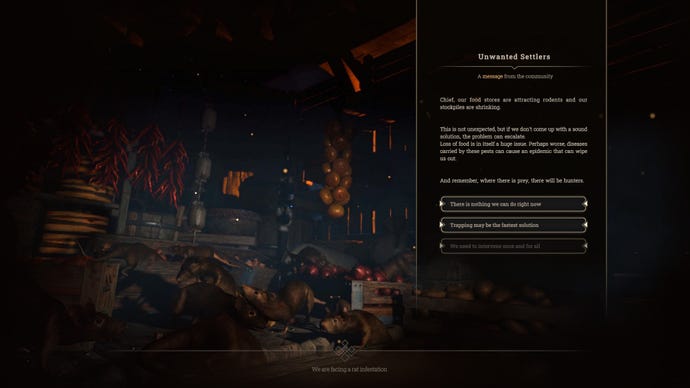
And yet, at present, all that thematic potential feels a bit conflicted. If all I'm doing is building a machine to fill a bunker to weather the storm, why not start out with the bunker instead of a massive town you'll just abandon? Perhaps the point is to build a world beyond that because survival is insufficient (watch Station Eleven, goddamn you), but I don't think New Cycle is there yet. It's sort of optimistic in that it kind of assumes there is a future, and yet the coming solar flares are apparently worse than the ones that wiped out a far more technologically capable civilisation. It's sort of about caring for people in that everyone has names and you can click on them to see where they work... but although nice, it isn't really utilised beyond that. Most buildings looks similar, making villages feel like very brown and samey machines, which fits the late game conveyor belts conceptually, but not so much the earlier stages.
"Evocative" is the word I'd use if these parts were adding up to more than their sum. I don't know what its inverse is, and it would be unfair to imply that New Cycle doesn't have potential. It certainly feels like it's trying something conceptually distinct from some of its closest peers, and drawing a bit of a mix and match from several subgenres rather than just going through the motions.
But my time with it was one of waiting for things to unlock and happen, until it finally dawned on me that I'd spent all that time waiting for the real game to begin. I should maybe spend it better by accepting that early access is exactly that, and hope to be singing its refurbished praises in a year or two.
